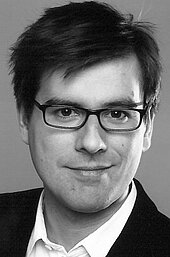Leven, Benjamin
Congratulations on passing the viva voce examination
on 27 February 2013.
Dissertation topic:
"Liturgical Reform and Piety - Processions and Devotions in the Diocese of Würzburg 1945-1975."
Contact address at the University of Würzburg:
Chair of Liturgy
Faculty of Catholic Theology
University of Würzburg
Paradeplatz 4
97070 Würzburg
Phone 0931 - 31 8 31 38
Room 308
First supervisor:Prof. Dr Martin Stuflesser
Second supervisors:
Prof. Dr Wolfgang Altgeld
Class in the Graduate School: "Antiquity, History and Religion"
Doctorate in the Graduate School since WS 2010/2011.
Abstract:
How did the practice of popular religiosity in Catholic parishes in the diocese of Würzburg change after the Second World War? What is the connection between these changes and the liturgical reform of the Catholic Church? And what influence did the social and cultural changes that took place at the same time have?
The research project understands liturgical reform not simply as a process of changing norms by ecclesiastical authorities, but focuses on the local actors and their concrete practice. Popular religiosity is chosen as the object of investigation because it represents an area of communal ritual action to which central ecclesiastical standardisation bodies only have partial access. It is therefore more flexible and diverse than the core ritual practices and should therefore allow the influence of socio-cultural changes to be recognised more directly.
The study analyses the concrete forms of communal popular religious practices in the diocese of Würzburg and traces their changes over the course of the period under investigation. Particular attention is paid to the practices of "innovators", protagonists of local reform. The supporting social and organisational structures at diocesan level are also taken into account. The social and mental history background is continuously integrated into the presentation. Finally, the insights gained are subjected to theological reflection, which takes up current liturgical-theological and ecclesiological issues.






